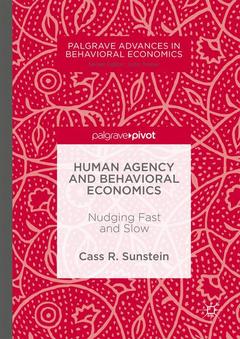Description
Human Agency and Behavioral Economics, 1st ed. 2017
Nudging Fast and Slow
Palgrave Advances in Behavioral Economics Series
Author: Sunstein Cass R.
Language: English
Subject for Human Agency and Behavioral Economics:
Publication date: 05-2017
Support: Print on demand
Support: Print on demand
Description
/li>Contents
/li>Biography
/li>Comment
/li>
This Palgrave Pivot offers comprehensive evidence about what people actually think of ?nudge? policies designed to steer decision makers? choices in positive directions. The data reveal that people in diverse nations generally favor nudges by strong majorities, with a preference for educative efforts ? such as calorie labels - that equip individuals to make the best decisions for their own lives. On the other hand, there are significant arguments for noneducational nudges ? such as automatic enrollment in savings plans - as they allow people to devote their scarce time and attention to their most pressing concerns.
The decision to use either educative or noneducative nudges raises fundamental questions about human freedom in both theory and practice. Sunstein's findings and analysis offer lessons for those involved in law and policy who are choosing which method to support as the most effective way to encourage lifestyle changes.
1. Introduction: Agency and Control.- 2. People Like Nudges (Mostly).- 3. People Prefer Educative Nudges (Kind Of).- 4. How to Choose.- 5. “What Route Would You Like Me To Take?” Paternalists Who Force Choices.
Cass R. Sunstein is the Robert Walmsley University Professor at Harvard University, USA. From 2009 to 2012, he was Administrator of the White House Office of Information and Regulatory Affairs. He is the founder and director of the Program on Behavioral Economics and Public Policy at Harvard Law School. Suntstein has written numerous books, including Nudge: Improving Decisions about Health, Wealth, and Happiness (with Richard H. Thaler, 2008) and Why Nudge?: The Politics of Libertarian Paternalism (2014).
Provides extensive data on popular opinions about educative and noneducative nudges Analyzes when it's best to educate decision makers or simply steer their choices Compares preferences for style of nudges among US political parties Includes supplementary material: sn.pub/extras
© 2024 LAVOISIER S.A.S.




